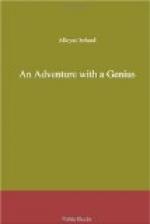At times Mr. Pulitzer did not feel well enough to take this concentrated mental food, and turned for relief to novels, plays and light literature; at times, when he was feeling unusually well, he occupied himself for several days in succession with matters concerning The World—in dictating editorials, letters of criticism, instruction and inquiry, or in considering the endless problems relating to policy, business management, personnel, and the soaring price of white paper.
An interesting feature of his activity on behalf of The World was his selection of new writers. Although his supervision of the paper extended to every branch, from advertising to news, from circulation to color-printing, it was upon the editorial page that he concentrated his best energies and his keenest observation.
It is no exaggeration to say that the editorial page of The World was to J. P. what a child is to a parent. He had watched it daily for a quarter of a century. During that time, I am told, he had read to him seventy-five per cent. of all the editorials which were printed on it, and had every cartoon described. Those who are interested in the editorial page of The World should read Mr. John L. Heaton’s admirable History of a Page, published last year.
J. P.’s theory of editorial writing, which I heard him propound a dozen times, called for three cardinal qualities—brevity, directness and style—and, as these could not be expected to adorn hasty writing, he employed a large staff of editorial writers and tried to limit each man to an average of half a column a day, unless exceptional circumstances called for a lengthy treatment of some important question.
He watched the style of each man with the closest attention, examining the length of the paragraphs, of the sentences, of the words, the variety of the vocabulary, the choice of adjectives and adverbs, the employment of superlatives, the selection of a heading, the nicety of adjustment between the thought to be expressed and the language employed for its expression.
If he chanced in the course of his reading to run across any apt phrase in regard to literary style he would get one of us to type a number of copies and send one to each of the editorial writers on The World. The following were sent from Wiesbaden:
“Thiers compares a perfect style to glass through which we look without being conscious of its presence between the object and the eye.” (From Abraham Hayward’s “Essay on Thiers.”)
“Lessing, Lichtenberger, and Schopenhauer agreed in saying that it is difficult to write well, that no man naturally writes well, and that one must, in order to acquire a style, work strenuously ... I have tried to write well."(Nietzsche.)
J. P. was never tired of discussing literary style, of making comparisons between one language and another from the point of view of an exact expression of an idea, or of the different sound of the same idea expressed in different languages. For instance, he asked us once during an argument about translations of Shakespeare to compare the lines:




